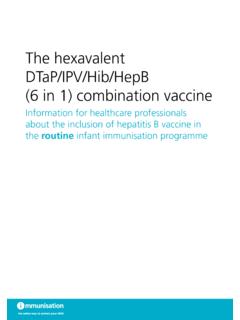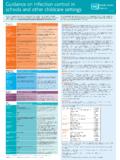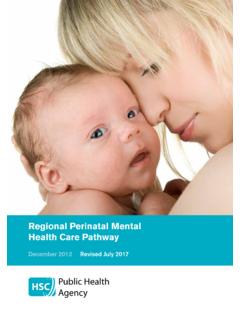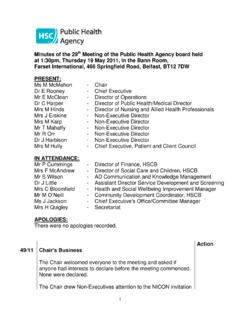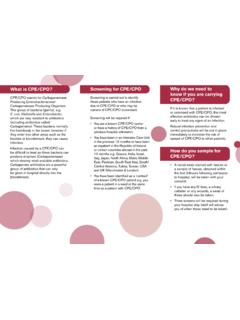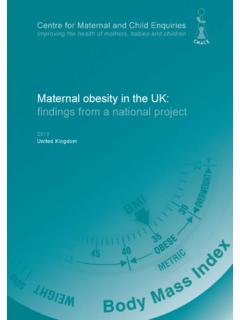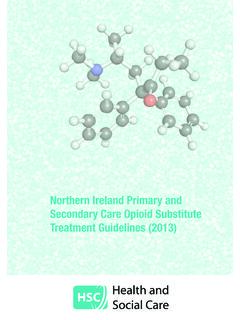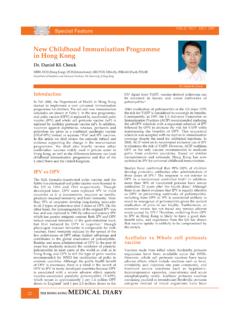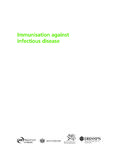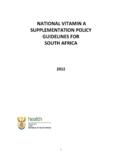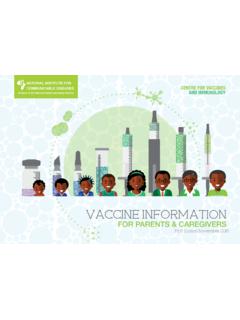Transcription of The hexavalent DTaP/IPV/Hib/HepB (6 in 1) combination …
1 The hexavalentDTaP/IPV/Hib/ hepb (6 in 1) combination vaccineInformation for healthcare professionals about the inclusion of hepatitis B vaccine in the routine infant immunisation programmeWhat is Infanrix hexa ?Infanrix hexa is a combination vaccine used for primary vaccination of infants to protect against diphtheria, tetanus, pertussis, hepatitis B, poliomyelitis and disease caused by Haemophilus influenzae type b. Infanrix hexa can also be used for catch-up immunisation for children up to their 10th birthday where these children have missed out on doses of primary immunisations. Multiple studies have shown Infanrix hexa to be safe and highly immunogenic for all its component will Infanrix hexa be introduced into the infant schedule?All babies born on or after 1 August 2017 will become eligible for the vaccine eight weeks after their birth.
2 Infanrix hexa vaccine is expected to be made available to order from September 2017 for use in the routine childhood primary immunisation schedule at 8, 12 and 16 weeks of age. Infants born before 1 August 2017 should complete their primary immunisation course with pentavalent vaccine (Pediacel or Infanrix-IPV+Hib ). Infanrix hexa should only be given to babies born before 1 August if there is no locally held vaccine stock and no further Pediacel or Infanrix-IPV+Hib can be ordered. Infanrix hexa should also be given if pentavalent vaccine is not readily available - vaccination should never be delayed in order to obtain the pentavalent is Infanrix hexa being introduced into the infant schedule?Hepatitis B is an infection of the liver caused by the hepatitis B virus (HBV). Most new infections with HBV are sub-clinical or may only cause a flu-like illness.
3 However, acute infection occasionally leads to sudden and severe liver damage which can be fatal. Chronic HBV infection can result in progressive liver disease, leading to cirrhosis (development of scar tissue) in some patients and an increased risk of developing liver 1992, the World Health Assembly recommended that every country should have a universal hepatitis B immunisation programme by 1997. As the UK is a low prevalence and low incidence country for hepatitis B, however, introducing a universal hepatitis B programme using a monovalent hepatitis B vaccine would not have been cost-effective. Recently, infant combination hepatitis B vaccines (which also protect against diphtheria, tetanus, polio, pertussis and Hib) have become available in the UK. In 2014, therefore, the Joint Committee of Vaccination and immunisation (JCVI) re-evaluated the benefits and cost-effectiveness of a universal BackgroundFrom autumn 2017, all babies born on or after1 August 2017 will become eligible for a hexavalent vaccine which includes hepatitis B ( hepb ) for their primary immunisations.
4 This vaccine, called Infanrix hexa , will replace the pentavalent infant vaccines Infanrix -IPV+Hib and Pediacel . The following questions and answers are intended to provide healthcare professionals with more information about this professionals with a responsibility for vaccinating babies at risk of hepatitis B (ie those born to mothers infected with hepatitis B virus) may find the answers to questions about these babies in The hexavalent DTaP/IPV/Hib/HepB combination vaccine: Information for healthcare practitioners about the neonatal selective immunisation programme for babies at risk of hepatitis B, available on the PHA immunisation webpage B infant immunisation programme in the UK and subsequently recommended the use of the hexavalent DTaP/IPV/Hib/HepB combination vaccine for all infants subject to securing the vaccine at a cost-effective price.
5 By providing hepatitis B vaccine as part of the combined infant vaccine, as well as being protected against diphtheria, tetanus, pertussis, polio and Hib, infants will now have the benefit of protection against hepatitis B virus. Where else is Infanrix hexa used?Infanrix hexa is not a new vaccine. It is licensed for use in 97 other countries across the world including Republic of Ireland, Canada, Australia and New Zealand. The vaccine was first licensed for use in Europe in October 2000 and approximately 150 million doses have been given to infants in Europe and across the world. What is the difference between Infanrix hexa , Infanrix -IPV+Hib and Pediacel ?All of these vaccines protect against the same five diseases (tetanus, diphtheria, whooping cough, polio and Hib). The main difference is that Infanrix hexa also offers protection against hepatitis B.
6 Two other differences between these products are that: 1. Infanrix hexa and Infanrix -IPV+Hib vaccine contain three pertussis components while Pediacel has five components but with slightly lower antigen content. 2. Infanrix hexa and Infanrix -IPV+Hib require reconstitution before being administered. Pediacel is presented in a pre-filled the Infanrix hexa vaccine safe and effective? Yes. The safety profile of Infanrix hexa is excellent. Any adverse events experienced are mild to moderate and are similar to those experienced following administration of the Pediacel and Infanrix -IPV+Hib vaccines. These may include redness, swelling and tenderness at the injection site, fever, irritability, loss of appetite, diarrhoea and vomiting. Results from clinical trials show that nearly all infants given the three dose primary vaccination course of Infanrix hexa at 8, 12 and 16 weeks of age develop protective levels of antibodies against diphtheria (100%), tetanus (100%), pertussis (100%), hepatitis B ( ), polio (98-100%) and Hib (96%).
7 23 Vaccine schedulingWhat is the schedule for Infanrix hexa ?The infant immunisation schedule remains unchanged at eight, twelve and sixteen weeks of age. The minimum age for a first dose is six weeks of age. The first dose of Infanrix hexa can be given from six weeks if required in certain circumstances eg travel to an endemic country. The schedule should then be completed with a minimum of four weeks between subsequent doses of Infanrix hexa .Can Infanrix hexa be administered at the same time as the other infant vaccines?Yes. Infanrix hexa can be administered at the same time as, or at any time before or after any other vaccine. Other countries routinely offer Infanrix hexa with the other infant vaccines, including rotavirus, pneumococcal conjugate vaccine (PCV) and MenB. 4 Can Infanrix hexa be given to premature infants?
8 Yes. Clinical data indicate that Infanrix hexa can be given to premature infants and it is important that premature infants receive their immunisations at the appropriate chronological age (ie age since birth, not corrected), according to the schedule. As the benefit of vaccination is high in this group of infants, vaccination should not be withheld or delayed. In comparative clinical studies, similar rates of adverse reactions were observed in pre-term and full-term infants. However, as for pentavalent vaccines, the occurrence of apnoea following vaccination is increased in infants who were born very prematurely. Very premature infants (born 28 weeks of gestation) who are in hospital should have respiratory monitoring for 48 to 72 hours when given their first immunisation , particularly those with a previous history of respiratory immaturity.
9 If the child has apnoea, bradycardia or desaturations after the first immunisation , the second immunisation should also be given in hospital, with respiratory monitoring for 48 to 72 should happen if the vaccine course is interrupted or an infant misses a scheduled dose? If the primary course is interrupted it should be resumed but not repeated, allowing an interval of four weeks between the remaining doses. Missed doses should be given as soon as should children with incomplete, uncertain or non-UK primary immunisations be given? If the child was born before 1 August 2017 in the UK or abroad and started on pentavalent vaccine, they should complete the primary course with pentavalent vaccine. Where possible, it is preferable that the same DTaP/IPV/Hib vaccine should be used for all three doses of the primary course.
10 If a different pentavalent vaccine is available from the one given to the child previously however, this other pentavalent vaccine should be given. If a pentavalent vaccine is no longer or not readily available, give hexavalent vaccine. This will provide equivalent protection against diphtheria, tetanus, pertussis, polio and Hib but the child will not be fully protected against hepatitis B. This is not a concern unless the child is at risk of hepatitis B (in which case a course of hepatitis B-containing vaccine should be given). Vaccination should never be delayed in order to obtain pentavalent vaccine. If the child was born abroad before 1 August 2017 and started on hexavalent vaccine in their country of origin they should complete their primary course with hexavalent vaccine. It is good practice to complete a course with the vaccine given previously where possible and it may be that hepatitis B is included in the primary schedule of their country of origin because there is a higher prevalence of hepatitis B.
